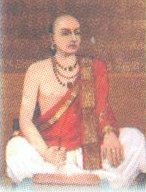
Nannayya Bhattaraka or Nannayya Bhattu was a Telugu poet and the author of Andhra Mahabharatam, a Telugu retelling of the Sanskrit-language Mahabharata. Nannaya is generally considered the first poet of Telugu language. He was patronized by Rajaraja Narendra of Rajamahendravaram. Rajaraja Narendra was an admirer of Mahabharata and wanted the message of the Sanskrit epic to reach the Telugu masses in their own language and idiom. He commissioned Nannaya, a scholar well versed in Vedas, Puranas, and Itihasas for the task. Nannaya began his work in c. 1025 CE and wrote Adi Parvam, Sabaparvam, and a part of Aranyaparvam.
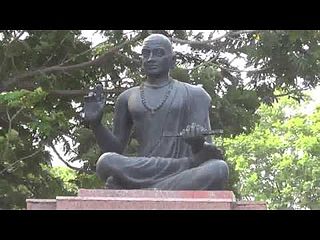
Tikkana (1205–1288) was a 13th century Telugu poet. Born into a Telugu-speaking Niyogi Brahmin family during the golden age of the Kakatiya dynasty, he was the second poet of the "Trinity of Poets " that translated Mahabharata into Telugu. Nannaya Bhattaraka, the first, translated two and a half chapters of Mahabharata. Tikkana translated the final 15 chapters, but did not undertake translating the half-finished Aranya Parvamu. The Telugu people remained without this last translation for more than a century, until it was translated by Errana.
The Reddi kingdom or Kondavidu Reddi kingdom was a kingdom established and ruled by Prolaya Vema Reddi from 1325 to 1448 CE in southern India. Most of the region that was ruled by the kingdom is now part of modern-day Rayalaseema, coastal and central Andhra Pradesh.

hi all
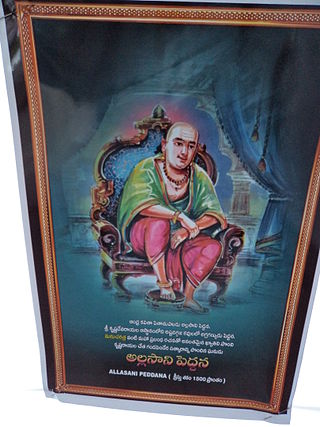
Mahakavi Allasani Peddana was a prominent Telugu poet and the foremost Ashtadiggaja in the imperial court of Emperor Krishnadevaraya of Vijayanagara.
Pingali Suranna was a Telugu poet and was one of the Astadiggajas.

Vijayanagara literature was produced in the Vijayanagara Empire during a golden age of literature in South India in general. The rulers patronised Kannada, Telugu, Sanskrit and Tamil scholars who wrote in the Jain, Virashaiva and Vaishnava traditions. The period produced hundreds of works on all aspects of Indian culture, religion, biographies, prabhandas (stories), music, grammar, poetics and medicine. An attempt is made in this section to list the various poets and saints and their most famous works.
Nanne Choda was a 12th century Telugu poet renowned for composing the famous work Kumara Sambhavam. He holds the titles Tekanadityudu (టెంకాణాదిత్యుడు) and Kaviraja Sikhamani. He is regarded as the first composer of Prabandha. The trio of Nanne Choda, Mallikarjuna Panditaradhya and Palkuriki Somanatha are referred as Śivakavitrayam. These trio along with Piduparthi poets and Yathavakkula Annamayya pioneered Veera Saiva movement in Andhra region.

Palaiyakkarars, or Poligar, Palegara in Andhra, Karnataka and Tamil Nadu were the holders of a small kingdom as a feudatory to a greater sovereign. Under this system, palayam was given for valuable military services rendered by any individual. The word pālayam means domain, a military camp, or a small kingdom. This type of Palayakkarars system was in practice during the rule of Pratapa Rudhra of Warangal in the Kakatiya kingdom. The system was put in place in Tamil Nadu by Viswanatha Nayak, when he became the Nayak ruler of Madurai in 1529, with the support of his minister Ariyanathar. Traditionally there were supposed to be 72 Palayakkarars. The majority of those Palaiyakkarar, who during the late 17th- and 18th-centuries controlled much of the Telugu region as well as the Tamil area, had themselves come from the Kallar, Maravar and Vatuka communities. Most palayakkars in western Tirunelveli and in Ramanathapuram were Maravar, those of Madurai, Tiruchi and Thanjavur Kallar, and those of eastern Tirunelveli, Dindigal and Coimbatore Nayak.
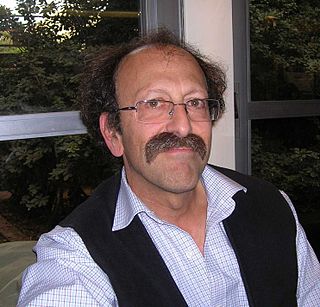
David Dean Shulman is an Israeli Indologist, poet and peace activist, known for his work on the history of religion in South India, Indian poetics, Tamil Islam, Dravidian linguistics, and Carnatic music. Bilingual in Hebrew and English, he has mastered Sanskrit, Tamil, Hindi, and Telugu, and reads Greek, Russian, French, German, Persian, Arabic and Malayalam. He was formerly Professor of Indian Studies and Comparative Religion at the Hebrew University, Jerusalem, and professor in the now defunct Department of Indian, Iranian and Armenian Studies. Presently he holds a chair as Renee Lang Professor of Humanistic Studies at the Hebrew University in Jerusalem. He has been a member of the Israel Academy of Sciences and Humanities since 1988.

Rao Venkata Kumara Mahipati Surya Rau CBE (1885–1964) was Maharajah of Pithapuram. He was called by Telugu people "Abhinava Krishnadevaraya". Maharani Sita Devi of Baroda was his daughter.

Veturi Prabhakara Sastri was a Sanskrit and Telugu scholar, editor, translator and historian. He was born in the town of Pedakallepalli in the Krishna District of Andhra Pradesh. He was known for deciphering a few thousand of Annamayya's composition during his tenure at the Devasthanam Oriental Institute. He is also recognized for his scholarship on Telugu poet Srinatha's work. Veturi was involved in researching lost texts and forgotten literature, and he is regarded for his enlightened and liberal scholarship that was free of literary or religious prejudices.
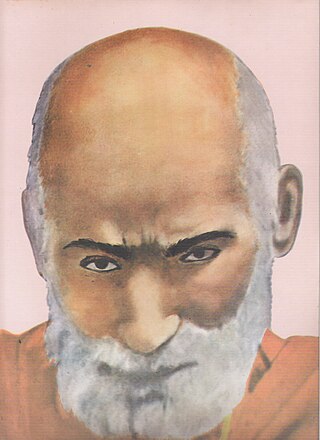
Chellapilla Venkata Sastry was a Telugu language poet laureate and scholar. He was one of the two poets known as Tirupati Venkata Kavulu and other being Divakarla Tirupati Sastry.
Vavilla Ramaswamy Sastrulu (1812–1891) was a Telugu Pundit and owner of the Telugu publishing house Saraswati Mudralayamu, which was later renamed Vavilla Press. The Vavilla family in Andhra Pradesh secured a page in history as a premier publishing house owning a press.

Srinatha Kavi Sarvabhoumudu is a 1993 Telugu-language biographical film, based on the life of 15th century poet Srinatha, produced by Nandamuri Rama Krishna under Ramakrishna Horticultural Studios & Srimathi Movie Combines banner and directed by Bapu. It stars N. T. Rama Rao, Jayasudha, Rajendra Prasad and music composed by K. V. Mahadevan. This is the final movie of legendary actor NTR and the debut of famous Telugu comedians A.V.S. and Gundu Sudarshan.
Velcheru Narayana Rao is an Indian author, critic, and literary translator. He is a professor at the University of Wisconsin–Madison in the Department of South Asian Studies. His work is primarily focused on Telugu literature for which he received the Sahitya Akademi Fellowship, the highest honour conferred by Sahitya Akademi, in February 2021.
Keyura-bahu-charitramu is a Telugu language poetic collection of short stories written by Manchana in the Velanati Choda kingdom of southern India in the 12th or the 13th century. The book's title is also transliterated as Keyura-bahu-charitra or Keyura-bahu-charitram.
Nachana Soma-natha was a 14th-century Telugu language poet from the Vijayanagara Empire of southern India. He translated the Sanskrit work Harivamsa into Telugu as Uttara-Harivamsamu, and also wrote the now-lost Vasanta Vilasamu, an early prabandha work.
Sūranna, who styled himself as Nūtana-kavi was a Telugu language poet from the Vijayanagara Empire of present-day southern India. He probably lived during the 15th or the 16th century, and is notable for Dhanabhi-ramamu, the story of a contest between Manmatha and Kubera.
Kākunūri Appa-kavi was a Telugu language poet and grammarian from present-day southern India, noted for writing the Telugu grammar book Appakavīyamu. He claims to have written the book at the instruction of the god Vishnu, based on a purported Sanskrit language work by the earlier poet Nannaya.











